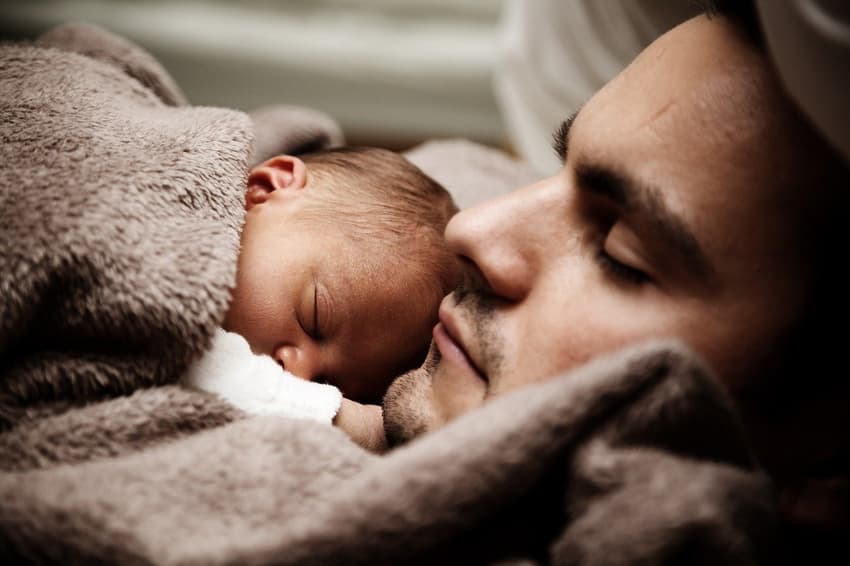Switzerland vs the EU: Where are working conditions better?

Many foreign nationals flock to Switzerland to work. But do Swiss employers really offer more and better benefits than their counterparts in the European Union?
In a recent article, The Local reported that nearly 65,000 German cross-border workers commute to their Swiss jobs each day.
For them, this employment opportunity is a huge boost to their standard of living.
This is not only because Swiss wages are quite a bit higher, but also because — some say — working conditions are better in Switzerland as well.
READ ALSO: Why cross-border workers from Germany love their Swiss jobs
This brings up a very pertinent question of how Swiss employment in general differs from working conditions throughout the EU?
Let’s start with wages
When it comes to salaries, Switzerland is far ahead of the European curve.
The median Swiss wage is 6,700 francs a month (80,400 a year), while in the EU it amounts to 2,178 euros a month or 26,136 euros a year.
Now, this is the average income, which combines both poorer members of the European Union, like Bulgaria, and wealthier ones such as Luxembourg.
However, if we compare just Switzerland’s immediate neighbours, we get a more accurate salary estimate: 3,650 euros (3,480 francs) in Germany; 3,300 euros / 3,155 francs in France; 2,627 euros / 2,512 francs in Italy; and 2,521 euros / 2,411 francs. in Austria.
Based on these numbers, Switzerland offers higher (by far) salaries than neighbour nations, which is certainly lucrative for foreign nationals, especially for cross-border workers who are employed in Switzerland but live abroad.
READ ALSO: Why French cross-border workers choose to work in Switzerland
So in this respect, Switzerland definitely comes out on top.

Swiss salaries are among the highest. Photo: Claudio Schwarz on Unsplash
What about other work conditions?
According to a report by the Federal Statistical Office (FSO), “In general, Switzerland compares well with other European countries.”
“For example, flexible working hours – with regard to the possibility of taking time off – and autonomy at work are more widespread in Switzerland,” FSO said.
On the other hand, however, Swiss employers grant their workers less flexibility in terms of modification of working hours than is the case in the EU.
Working hours
In Switzerland, 45 hour- work weeks are standard for employees in industry, office and technical staff, and retail personnel.
Employees in all other sectors work 50 hours per week.
How does this compare to the EU?
The answer here is a bit complicated because, according to Euronews, “the average hours worked per week in Europe vary widely. The average number of actual weekly working hours in the EU ranges from 32.4 hours in the Netherlands to 39.7 hours in Greece and Romania".
The Swiss, therefore, work more hours than other Europeans.
Vacation time
Here too, EU workers have the upper hand.
Switzerland’s paid annual leave — four weeks, or 20 days —is not as generous as some other European nations’, but on the par with others.
This applies to people over the age of 20; under Swiss law, at least five weeks’ leave must be given in the case of employees who have not yet reached the age of 20.
French workers get more —25 days— as do Austrians, Danes and Swedes.
The Swiss are in the average, along with Germany and Italy.
If the Swiss don’t get more annual leave, however, they have only themselves to blame.
In what should go under the heading of 'Only in Switzerland', in a 2012 referendum, 67 percent of the country’s voters rejected (yes, rejected) the proposal to extend the mandatory leave to six weeks.
Why? Because they believed longer holidays would cost the economy billions of francs each year, and the money-conscious Swiss just couldn't allow that.
As the media reported at the time, the outcome showed that Swiss voters had realised "something which sounds nice at first, on closer look brings many disadvantages" and that "citizens have kept a sense of reality".
However, many companies offer their employees more than the legal minimum; the exact number of days or weeks is outlined in an employment contract.

Swiss get less annual leave than some other Europeans. Image by sarahbernier3140 from Pixabay
Parental leave
Here Switzerland lags behind many other countries.
The EU legislation sets the minimum period for paid maternity leave at 14 weeks, though many countries — including France and Italy — grant longer leaves.
And a Swedish mother or father) gets 480 days' parental leave.
Fathers in many EU nations (including France and Austria) are entitled to at least four weeks, and even more in Portugal (nine), Spain (16), and Finland (19).
In Switzerland mothers are entitled to 14 weeks and fathers to two.
Why is Switzerland so stingy in granting paternity leave?
The country has a strong history of individual responsibility, which promotes the idea that the state (or employer) should not pay for people choosing to have children.
However, things are starting to change.
In June, Geneva residents had voted for a 24-week paid leave package for new parents — the first and the only Swiss canton to do so.
This will grant new parents a paid leave that is six weeks longer than the current (cumulative) period allowed by the law.
READ ALSO: What to know about Geneva's plan to extend parental leave
On the whole, which country has the most satisfied workforce?
We do know, from a survey conducted in Switzerland by EY consultants, that 87 percent of respondents said they were ‘satisfied’ or ‘very satisfied’ with their job.
They also seem relatively content with their employers and working conditions because they strike much less than their European counterparts.
One reason may be that they don’t have any major, unresolved issues that would force them to undertake industrial actions at the same frequency as workers in other nations.
Another factor, according to Hansjörg Schmid, a spokesperson for the Swiss Employees Association, is both cultural and practical.
They prefer to resolve any problems through the negotiation process, or perhaps the Swiss are more conflict avoidant in nature."
“It is in our genes to solve problems by talking to each other rather than more antagonistic means,” he added.“This tradition is anchored in our society and can also be seen in Swiss democracy. People can voice their opinions and change things through referendums, which also reduces conflict."
Comments
See Also
In a recent article, The Local reported that nearly 65,000 German cross-border workers commute to their Swiss jobs each day.
For them, this employment opportunity is a huge boost to their standard of living.
This is not only because Swiss wages are quite a bit higher, but also because — some say — working conditions are better in Switzerland as well.
READ ALSO: Why cross-border workers from Germany love their Swiss jobs
This brings up a very pertinent question of how Swiss employment in general differs from working conditions throughout the EU?
Let’s start with wages
When it comes to salaries, Switzerland is far ahead of the European curve.
The median Swiss wage is 6,700 francs a month (80,400 a year), while in the EU it amounts to 2,178 euros a month or 26,136 euros a year.
Now, this is the average income, which combines both poorer members of the European Union, like Bulgaria, and wealthier ones such as Luxembourg.
However, if we compare just Switzerland’s immediate neighbours, we get a more accurate salary estimate: 3,650 euros (3,480 francs) in Germany; 3,300 euros / 3,155 francs in France; 2,627 euros / 2,512 francs in Italy; and 2,521 euros / 2,411 francs. in Austria.
Based on these numbers, Switzerland offers higher (by far) salaries than neighbour nations, which is certainly lucrative for foreign nationals, especially for cross-border workers who are employed in Switzerland but live abroad.
READ ALSO: Why French cross-border workers choose to work in Switzerland
So in this respect, Switzerland definitely comes out on top.

What about other work conditions?
According to a report by the Federal Statistical Office (FSO), “In general, Switzerland compares well with other European countries.”
“For example, flexible working hours – with regard to the possibility of taking time off – and autonomy at work are more widespread in Switzerland,” FSO said.
On the other hand, however, Swiss employers grant their workers less flexibility in terms of modification of working hours than is the case in the EU.
Working hours
In Switzerland, 45 hour- work weeks are standard for employees in industry, office and technical staff, and retail personnel.
Employees in all other sectors work 50 hours per week.
How does this compare to the EU?
The answer here is a bit complicated because, according to Euronews, “the average hours worked per week in Europe vary widely. The average number of actual weekly working hours in the EU ranges from 32.4 hours in the Netherlands to 39.7 hours in Greece and Romania".
The Swiss, therefore, work more hours than other Europeans.
Vacation time
Here too, EU workers have the upper hand.
Switzerland’s paid annual leave — four weeks, or 20 days —is not as generous as some other European nations’, but on the par with others.
This applies to people over the age of 20; under Swiss law, at least five weeks’ leave must be given in the case of employees who have not yet reached the age of 20.
French workers get more —25 days— as do Austrians, Danes and Swedes.
The Swiss are in the average, along with Germany and Italy.
If the Swiss don’t get more annual leave, however, they have only themselves to blame.
In what should go under the heading of 'Only in Switzerland', in a 2012 referendum, 67 percent of the country’s voters rejected (yes, rejected) the proposal to extend the mandatory leave to six weeks.
Why? Because they believed longer holidays would cost the economy billions of francs each year, and the money-conscious Swiss just couldn't allow that.
As the media reported at the time, the outcome showed that Swiss voters had realised "something which sounds nice at first, on closer look brings many disadvantages" and that "citizens have kept a sense of reality".
However, many companies offer their employees more than the legal minimum; the exact number of days or weeks is outlined in an employment contract.

Parental leave
Here Switzerland lags behind many other countries.
The EU legislation sets the minimum period for paid maternity leave at 14 weeks, though many countries — including France and Italy — grant longer leaves.
And a Swedish mother or father) gets 480 days' parental leave.
Fathers in many EU nations (including France and Austria) are entitled to at least four weeks, and even more in Portugal (nine), Spain (16), and Finland (19).
In Switzerland mothers are entitled to 14 weeks and fathers to two.
Why is Switzerland so stingy in granting paternity leave?
The country has a strong history of individual responsibility, which promotes the idea that the state (or employer) should not pay for people choosing to have children.
However, things are starting to change.
In June, Geneva residents had voted for a 24-week paid leave package for new parents — the first and the only Swiss canton to do so.
This will grant new parents a paid leave that is six weeks longer than the current (cumulative) period allowed by the law.
READ ALSO: What to know about Geneva's plan to extend parental leave
On the whole, which country has the most satisfied workforce?
We do know, from a survey conducted in Switzerland by EY consultants, that 87 percent of respondents said they were ‘satisfied’ or ‘very satisfied’ with their job.
They also seem relatively content with their employers and working conditions because they strike much less than their European counterparts.
One reason may be that they don’t have any major, unresolved issues that would force them to undertake industrial actions at the same frequency as workers in other nations.
Another factor, according to Hansjörg Schmid, a spokesperson for the Swiss Employees Association, is both cultural and practical.
They prefer to resolve any problems through the negotiation process, or perhaps the Swiss are more conflict avoidant in nature."
“It is in our genes to solve problems by talking to each other rather than more antagonistic means,” he added.“This tradition is anchored in our society and can also be seen in Swiss democracy. People can voice their opinions and change things through referendums, which also reduces conflict."
Join the conversation in our comments section below. Share your own views and experience and if you have a question or suggestion for our journalists then email us at [email protected].
Please keep comments civil, constructive and on topic – and make sure to read our terms of use before getting involved.
Please log in here to leave a comment.